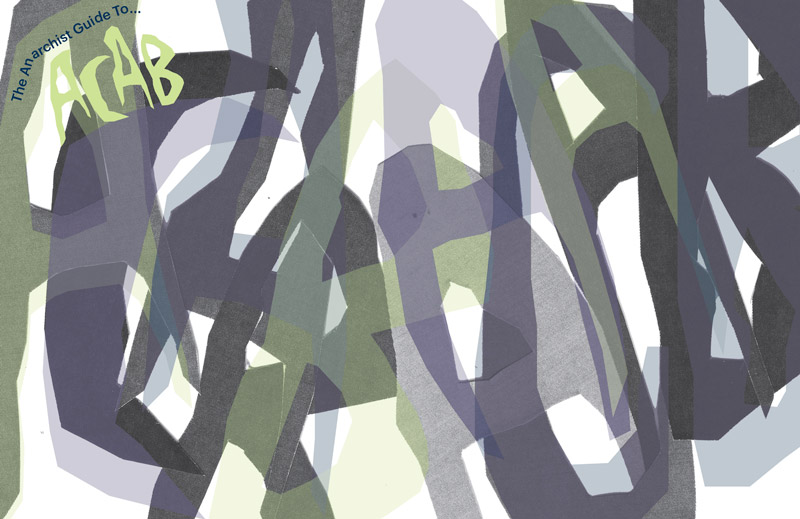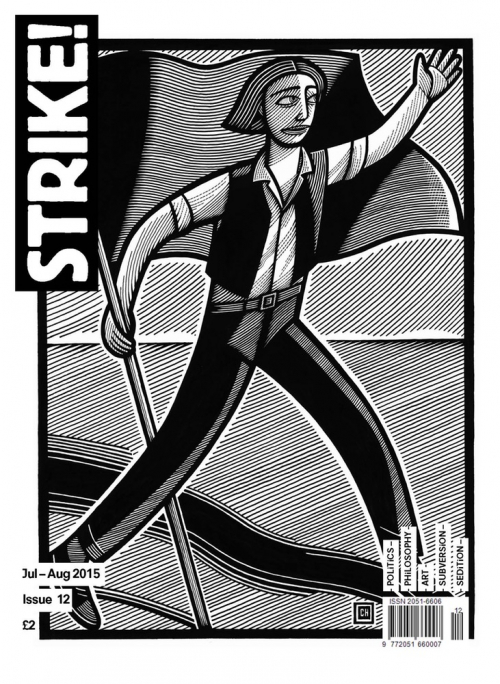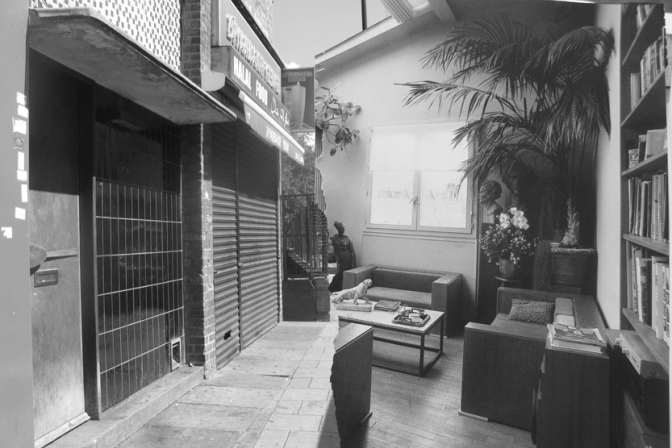An Anarchist Guide To...ACAB

In 1819 at St. Peter's Fields in Manchester, cavalry charged a crowd that had met to demand political reform, killing fiveteen and wounding hundreds. Fourteen years later Chartists met at Coldbath Fields in London to protest the inadequacy of the 1832 Great Reform Act, which left the majority of working people disenfranchised. This demonstration also met with violence, but the military were in plain clothes and crowd control was left to the newly established police force. Discussions about the reorganisation of policing had started some years before the Manchester Peterloo Massacre, resulting in the introduction of the Irish Constabulary in 1822 and the London Metropolitan Police force seven years later. Policing was not new. The novelty of Robert Peel's re-organisation was that it led to the creation of uniformed force under the control of the Home Secretary. In Ireland the police were deployed against the rural poor to deal with civil unrest and attacks on landlords and property. On the mainland, the new permanent force saved local constables from having to call out the militia to put down public disturbances arising from an array of social, political and economic demands linked to unemployment, poverty and famine. The innovation was not welcomed, even though the inadequacy of the old police systems in the cities was widely recognised. After trying to wrest a flag from demonstrators at the Coldbath Fields meeting, three policeman were stabbed—one fatally. There was no public outcry. A coroner's jury returned a verdict of justifiable homicide on Robert Culley, the dead officer.
Shelley's outraged response to the Manchester Peterloo Massacre was the Mask of Anarchy. The anarchy the poem refers to is precisely opposite to the kind of order that Proudhon defined. Anarchy's cry is ‘I AM GOD, AND KING, AND LAW!’ The masks Shelley describes are worn by ministers, spies, lawyers and churchmen in order to conceal their murder, fraud, hypocrisy and destruction—the system of violence, tyranny and terror exercised to enslave and exploit the general population.
How public perceptions change.
In 1911, the killing of a police officer in Houndsditch by a gang presumed to be anarchists led to calls for tighter border controls, to prevent the entry of criminal aliens into the country, and the arming of the police. What most struck Dr. Waldo, the coroner at Sgt. Bentley's inquest, was that his assailants had been armed. It follows, then, that the duty of government was to eliminate the risk of harm to the police, who gallantly protected the public. The dangers implicit in the imposition of a government-controlled force designed to command and subdue the civilian population, let alone the menace of arming the police against communities that are typically unarmed, seemed to pass him by.
‘The Mask of Anarchy’ was removed from the English Literature GCSE syllabus because it was deemed too difficult to teach. Is it too fanciful to imagine police confiscating the poem in order to prevent radicalisation under new anti-terror legislation? Waldo's view is where mainstream opinion now tends to sit: policing and the aggressive enforcement of law is the norm.
The seventh of Robert Peel's nine principles of policing (based on the General Instructions issued to every member of the Metropolitan Police at the time of its foundation in 1829, and reaffirmed in the 2008 Flanagan Interim Report on Policing) is to ‘maintain at all times a relationship with the public that gives reality to the historic tradition that the police are the public and that the public are the police, the police being only members of the public who are paid to give full time attention to duties which are incumbent on every citizen in the interests of community welfare and existence’. This was the tradition that Josephine Butler, one of Peel's Victorian critics, believed his reforms had traduced. Policing was part of a process of centralisation that undermined self-government and the libertarian principles of ‘mutual protection and responsibility’ essential to it. It wrongly treated security as the ‘highest object of pursuit for society’ instead of the desirable outcome of self-regulating social practices. Re-defined as the first duty of government, security also became a commodity that could be delivered only by government. In Butler's book, government by police was tyranny in whatever constitutional arrangement it functioned. In liberal Britain she found an example of its operation in the Contagious Diseases Act—a particularly invasive kind of stop and search policy that gave police powers to arrest women suspected of prostitution in a quest to prevent the spread of VD in the army. The law was wrong, its enforcement was brutal and it highlighted how far the relationship between the public and the police had been skewed: how could the public be the police, if the government was organising the force to maintain injustice, repress protests against injustice and effectively criminalise any part of the population deemed to be a threat to order? The sixth of Peel's principles gave the lie to the seventh: ‘To use physical force only when the exercise of persuasion, advice and warning is found to be insufficient to obtain public co-operation to an extent necessary to secure observance of law or to restore order, and to use only the minimum degree of physical force which is necessary on any particular occasion for achieving a police objective’.
Police authorities now admit that a handful of officers might be corrupt, racist, out of control, or all of these. The spotlight shone on a series of deplorable incidents makes it difficult to argue otherwise. But Dr. Waldo's unidirectional reading of the police-public relationship survives largely intact, despite the best efforts of Copwatch and others. However much outrage is expressed about Hillsborough, the investigation into the murder of Stephen Lawrence, the assault on Ian Tomlinson—the list goes on—the cover-ups, lies and killings that officers commit are treated as aberrations in a history of honourable public service. For all the hand wringing that follows in the wake of police misconduct—and it's rare to see action taken—the standard response is that wrongdoing within the force is effectively dealt with by the police themselves taking appropriate action against those at fault. Independent complaints procedures reinforce the presumption that 'service failures' are individual or operational or explained by government funding cuts. For press as for police, access to complaints mechanisms attests to the high standards that these bodies typically uphold. Public harm is not linked to police failure.
Public harm instead attaches to injuries sustained by the police. The wounding or death of a police officer sets off a moral panic about general lawlessness and criminality—usually identified in particular groups in the community—which serves as a platform to call for more surveillance, compulsory full-life tariffs or capital punishment for perpetrators and/or the routine arming of officers. Likewise the perceived threat of injury to officers is the benchmark for the use of reasonable violence. In the States, police are congratulated for not responding to provocation with lethal force. Derek Bentley says ‘let him have it’ and an officer is shot. Michael Brown says ‘don't shoot’. Look what happens: Bentley is executed and Brown is gunned down.
The considerable advantage that the police enjoy in sustaining the police-public relationship is the ability to disassociate itself from the laws it is charged to enforce. The fifth of Peel's principles is to ‘seek and preserve public favour by constantly demonstrating absolutely impartial service to law, in complete independence of policy, and without regard to the justice or injustice of the substance of individual laws, by ready offering of individual service and friendship to all members of the public without regard to their wealth or social standing, by ready exercise of courtesy and friendly good humour; and by ready offering of individual sacrifice in protecting and preserving life.’ Not only is there no obligation to consider the content of the law, there's an obligation to enforce laws without consideration. The biases that the ‘Mask of Anarchy’ exposes are implicit in the recognition of the inequalities that the police are bound to ignore when they go about their business. Friendly good humour doesn't go far with migrants, nomadic and homeless people's criminalised by the provisions of the Anti-Social Behaviour Acts that prohibit, for example, begging and deliberate setting of fires. Having been given authority to maintain public order, the police are able to devolve responsibility for the law to those who make it (and since Peterloo and Coldbath fields, that's us, of course). This move facilitates the detachment of policing, represented as sacrificial public service, from the framing of law, even though one is intimately connected to the other.
All cops are bastards? No. But if the public protests about the way that law is enforced, the police talk about the necessity of maintaining order. When the public protests about the unfairness of the law, the police talk about impartiality. And when the public reacts against the effects of law, it claims courageous devotion to the duty. The police are powerless to answer back.

Get it here
